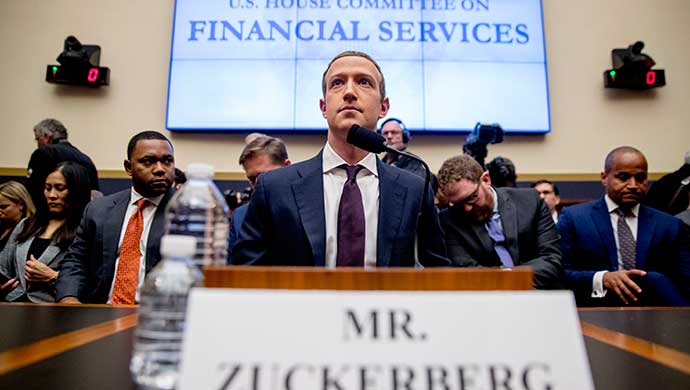Critics say Facebook’s Libra threatens America’s power. Zuck says they’ve got it all wrong.

Facebook has a new strategy for persuading US policymakers to support its plan to launch a digital currency: appeal to their patriotism.
Regulators should view Libra as an instrument of American geopolitical power, CEO Mark Zuckerberg argued several times during a six-hour hearing of the House Financial Services Committee on Wednesday.
The prospective currency has been called a threat to America’s outsize influence over the global financial system. Since the dollar is the world’s most popular reserve currency, other nations need access to it in order to trade with each other, and much of global trade flows through US banks. That means the country’s government has a unique power to inflict harm on other states and international criminals, by imposing sanctions that cut them out of the system.
Congresswoman Maxine Waters of California, chair of the Financial Services Committee, has said she's concerned that Libra, if allowed to launch, would “rival” the dollar. Congressman Brad Sherman of California, also a member of the committee, has probably been the most vocal critic. He has argued that Libra has the potential “to transfer power from the United States government to sanctions and tax evaders, terrorists, and drug dealers while reducing the importance of the US dollar as the reserve and trade currency.”
Zuckerberg, in his opening testimony on Wednesday, said the opposite is true. Libra, as currently envisioned, will be backed by a reserve composed of several sovereign currencies. But since the reserve will “mostly” be dollars, Zuckerberg said, regulators should see it as an opportunity to “extend America’s financial leadership as well as our democratic values and oversight around the world.”
He also invoked one of America’s actual rivals. China “is moving quickly” to launch a digital version of its currency “in the coming months,” Zuckerberg said, adding that it is intent on “exporting” its currency around the world.
But while Chinese officials have previously suggested that the digital renminbi is “close,” more recently they’ve said there is “no timetable” for its release.
That doesn’t mean he’s wrong about China’s ambitions. Some foreign policy analysts think China may encourage countries to adopt its currency as part of its Belt and Road Initiative, a global strategy to develop trade infrastructure. “If America doesn’t innovate, our financial leadership isn’t guaranteed,” Zuckerberg said at the hearing.
Even if he’s right, why should a private entity be trusted to create a global currency? As a new report from the Group of Seven highlights, the potential risks posed by the widespread adoption of something like what Facebook has said it envisions in Libra are not fully understood.
Ultimately, many people argue that the responsibility for issuing and managing currency should be left to the state. Might we see the Federal Reserve issue digital dollars to compete with China? The bank’s leaders have said that’s not in the cards, at least for now. But this is a fast-changing scene. Patrick Harker, president of the Philadelphia Fed, said earlier this month it is “inevitable” that central banks including the Fed will eventually issue digital currencies. Still, he said, “I don’t think we should be the first mover as a nation to do this.”
Keep up with the fast-moving and sometimes baffling world of cryptocurrencies and blockchains with our weekly newsletter Chain Letter. Subscribe here. It’s free!
Keep Reading
Most Popular
Large language models can do jaw-dropping things. But nobody knows exactly why.
And that's a problem. Figuring it out is one of the biggest scientific puzzles of our time and a crucial step towards controlling more powerful future models.
The problem with plug-in hybrids? Their drivers.
Plug-in hybrids are often sold as a transition to EVs, but new data from Europe shows we’re still underestimating the emissions they produce.
Google DeepMind’s new generative model makes Super Mario–like games from scratch
Genie learns how to control games by watching hours and hours of video. It could help train next-gen robots too.
How scientists traced a mysterious covid case back to six toilets
When wastewater surveillance turns into a hunt for a single infected individual, the ethics get tricky.
Stay connected
Get the latest updates from
MIT Technology Review
Discover special offers, top stories, upcoming events, and more.